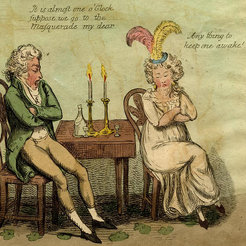The End of Sympathy. Feelings, Insensibility, and the British Idea of Progress, c. 1780 to 1840
Kerstin Maria Pahl
“If fanaticism is to be dreaded much, apathy is to be dreaded still more.”
In the global age of revolutions (1775–1848), which, in Britain, was an age of reform, industrialization, and empire-building, the major antagonistic force to progress was thought to be an obdurate heart. If the country was to become modern, its politicians and institutions had to avoid radical enthusiasm, while still nurturing interest in the state of the nation. Alongside changing the material infrastructure, political, philosophical, religious, and scientific writings concurred, one had to change the moral and emotional infrastructure, and improving the living conditions led to improved feelings on the part of the populace—a line of reasoning that was quickly woven into the empire’s ideology.
This project investigates the idea of progress by looking at one of its foils, the idea of emotional stagnation. From the second half of the 18th century, debates on insensibility, indifference, apathy, callousness, and other kinds of “want of feeling” (Adam Smith) demonstrate how the moral failure of insensitivity became a political problem. Moreover, and due to the concurrent rise of the social sciences, it was seen as a problem that could be solved: Insensitivity was no inherent feature of the human condition; people became dull because of the circumstances under which they lived and labored. Defunct roads and dilapidated buildings led to stunted spirits; working on a slave ship was a horror for the enslaved and so hardened the perpetrators that they became outcasts from the “emotional community” Britain and the empire was imagined as. Successful research into anesthesia confirmed that insensibility could be intentionally produced and abolished.
The management of emotions, and in particular the fight against disaffectedness, turned into a key factor in political interventions far beyond British shores. Being insensible, indifferent, apathetic became equated to being not only uncivil, but also uncivilized. Sunday schools in Philadelphia and missions in Guangzhou aimed at curing the alleged mental numbness through moral education. While insensitivity thereby bolstered gendered and racialized notions of “uncivilized” behaviour to legitimize religious and medical missions, even military interventions, detachment became, in a few cases, an attitude of resistance. It signalled refusal to comply with normative morality and challenged the—often fraught—ideas of what constituted “active interest.”
Key References

